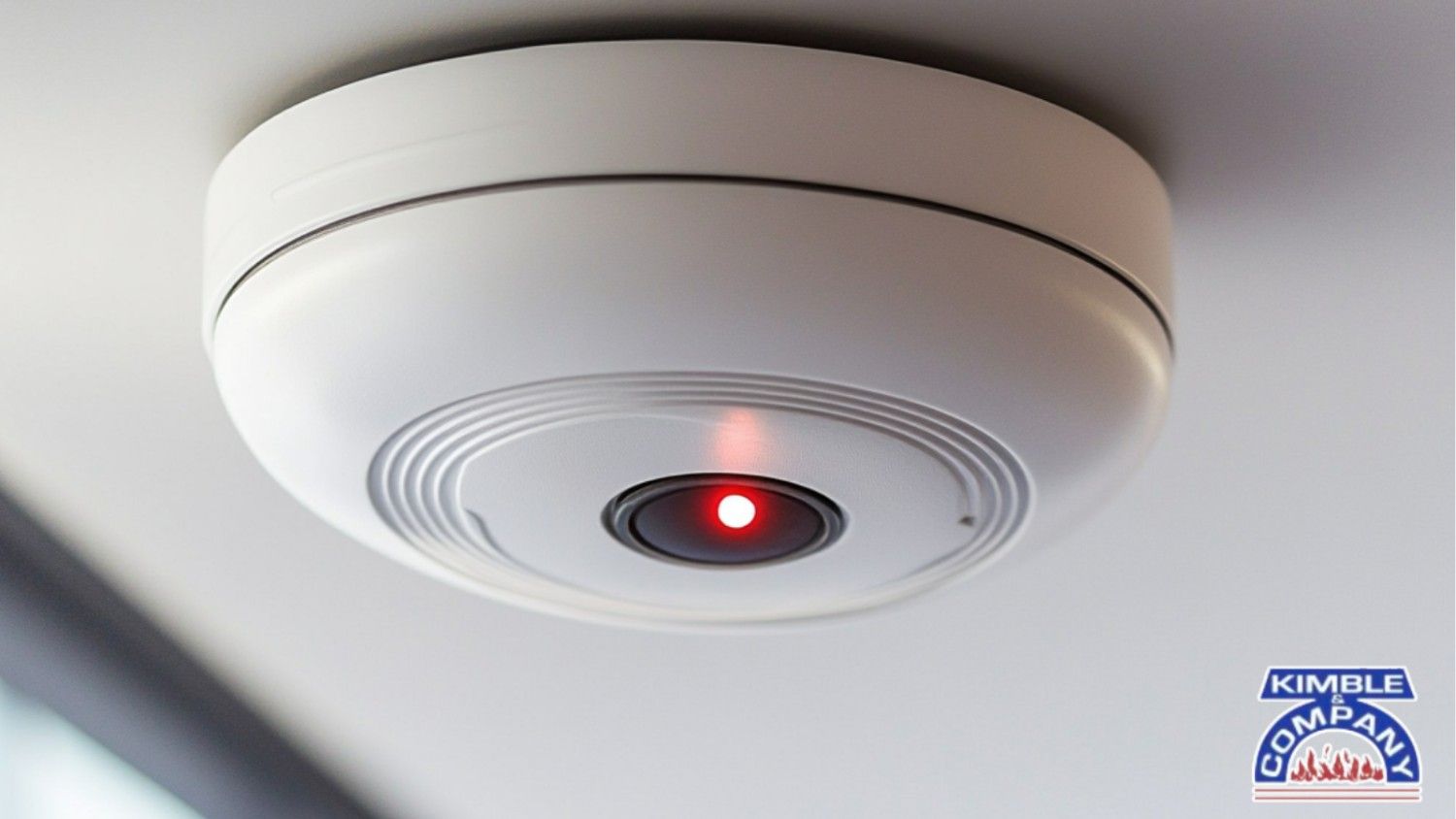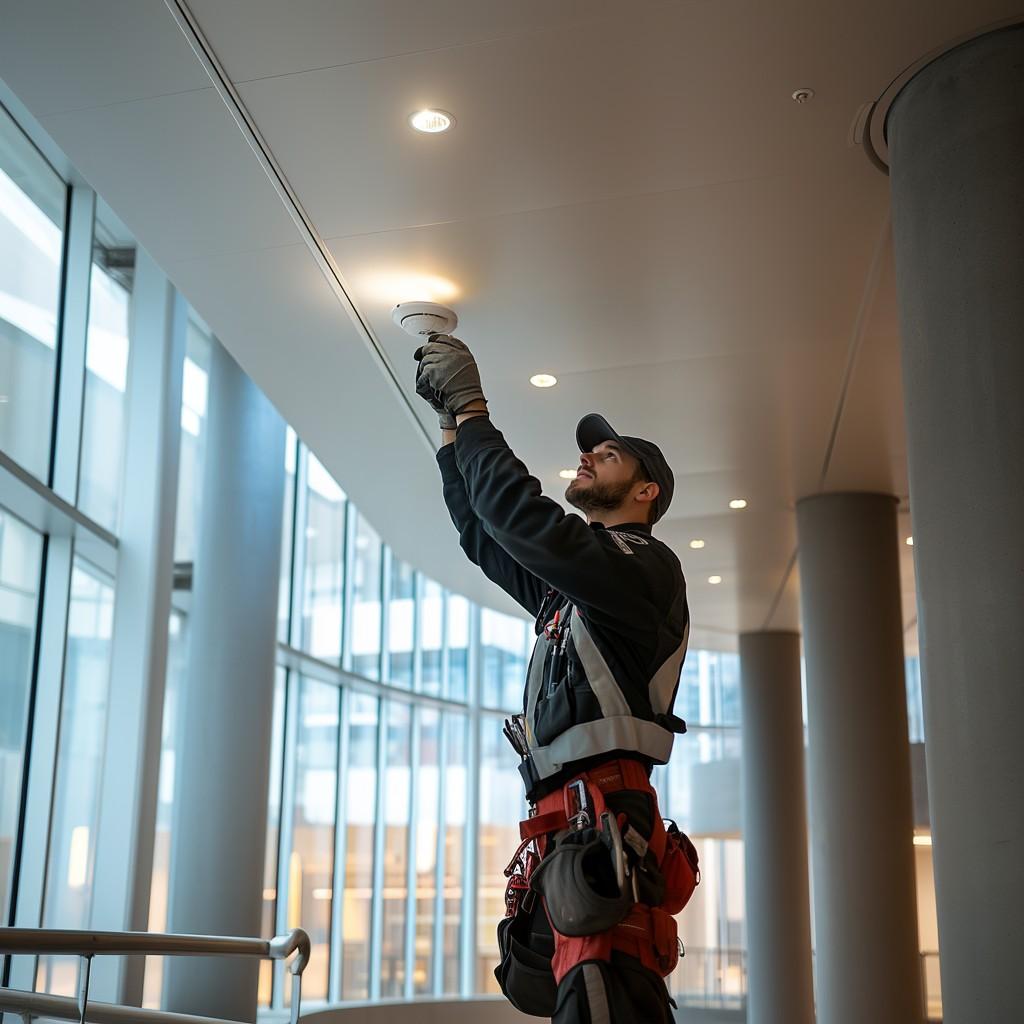A smoke alarm is a device that detects the presence of smoke, typically as an indicator of fire. It’s designed to alert occupants through an audible or visual alarm when smoke is detected, giving people time to evacuate and respond to potential fire hazards. Smoke alarms are generally used in commercial settings and are a significant part of a fire protection system. They are equipped with sensors that detect either ionization (for flaming fires) or photoelectric (for smoldering fires).
This blog will explore the common causes of smoke alarm beeping in commercial settings, provide troubleshooting tips, and discuss the importance of professional maintenance for reliable fire protection.
Understanding Different Smoke Alarm Sounds
Smoke alarms are designed to emit distinct sounds to communicate specific alerts or maintenance needs. Each sound is carefully engineered to indicate a particular status or issue, and understanding what each sound means can help you take the appropriate action. Below are the standard smoke alarm sounds you may encounter and what they signify:
Continuous Loud Alarm
A continuous, high-pitched sound that does not stop indicates the detection of smoke or fire. This is the most urgent alarm and should be treated as a warning of a potential fire hazard.
In this situation, immediate evacuation is necessary, and you should activate your emergency response plan. If there are no visible signs of fire or smoke, it’s still crucial to follow evacuation procedures until a certified professional identifies the cause of the alarm and verifies it as a false alarm.
Intermittent Beeping or Chirping
Intermittent beeping or chirping is generally a maintenance alert rather than an emergency warning. This sound often indicates that the smoke alarm requires attention for one of the following reasons:
- Low Battery Alert: One short beep every few minutes signals that the battery is low and needs to be replaced. This is a common occurrence in battery-powered or battery-backup smoke alarms. Replacing the battery will stop the beeping and ensure the alarm remains operational.
- End-of-Life Signal: Many smoke alarms emit a chirping sound when they have reached the end of their useful life, typically around 7 to 10 years. This sound indicates that the entire unit needs to be replaced to ensure continued protection.
- Dirty or Obstructed Sensor: If the sensor is dirty or blocked by dust, the smoke alarm may emit intermittent chirps to signal that it requires cleaning. Regular maintenance, such as vacuuming around the unit and keeping it free from debris, can prevent this issue.
- Wiring or Electrical Issues: A smoke alarm connected to an electrical system may chirp intermittently due to loose connections or wiring issues. If this is the case, a certified technician must inspect and repair the wiring to restore the alarm’s full functionality.
Rapid Beeping in Intervals
If your smoke alarm is emitting rapid beeping in consistent intervals—such as three beeps followed by a pause—it typically indicates the presence of smoke or a potential fire hazard. This alert pattern should be addressed immediately, as it signifies a serious risk. Evacuate the area promptly and contact emergency services.
Hush Mode Sound
When a smoke alarm is temporarily silenced using the hush button—often used to silence a false alarm caused by cooking or steam—the unit will emit a soft chirping sound or a quick beep every 30 seconds. This indicates that the alarm is in hush mode and will automatically reset after a short period (typically 8 to 10 minutes), returning to regular operation.
Low-Frequency Beeping (for Hearing Impaired Alarms)
Some smoke alarms are designed with low-frequency sound output for deaf people. If you hear a low-frequency, repetitive beep, this is usually the same as a standard alarm sound but with a frequency that is easier for individuals with hearing difficulties to detect. This sound should be responded to in the same manner as a regular alarm.
Each sound a smoke alarm emits is designed to convey a specific message, whether it’s an emergency or a routine maintenance need. Correctly identifying these sounds ensures that you respond appropriately, maintain the safety of your building, and keep your smoke alarm system in optimal working condition. Regular testing, maintenance, and professional inspections are vital to ensuring these devices function correctly when needed most.
Preventative Maintenance for Commercial Smoke Alarms
Preventative maintenance is crucial to ensuring that your smoke alarm system operates efficiently and meets all regulatory standards. Regular inspections, testing, and cleaning can help identify and resolve potential issues before they result in persistent beeping or system failures.
Regular System Testing
Schedule regular testing for all smoke alarms in your building to ensure they are in good working order. Reg 4 testing, a mandatory fire safety procedure in many municipalities, helps confirm that your system meets all local regulations and safety codes.
Routine Cleaning and Maintenance
Dust and debris buildup are common issues in commercial environments. Routine cleaning and sensor maintenance will help prevent false alarms and extend the lifespan of your smoke alarm system.
Professional Inspections
Professional fire safety inspections can identify underlying issues such as wiring faults, outdated components, or environmental factors affecting the sensors. Certified technicians can address these issues promptly, ensuring your smoke alarm system functions optimally.
Choosing the Right Type of Smoke Alarms for Your Commercial Building
Selecting the correct type of smoke alarm for your commercial property is crucial for providing comprehensive protection. Commercial buildings vary significantly in their layout, purpose, and occupancy, which means that the smoke alarm system should be tailored to suit these unique conditions. Understanding the different types of smoke alarms available and where to install them can help ensure optimal safety and compliance with local fire codes.
Types of Smoke Alarms and Their Applications
There are various types of smoke alarms, each designed for specific environments and smoke detection needs. Choosing the correct type will not only enhance safety but also minimize the occurrence of false alarms:
- Ionization Smoke Alarms: These alarms are highly sensitive to small smoke particles typically produced by fast-flaming fires, making them ideal for areas like storage rooms or offices that contain flammable materials. However, they can be prone to false alarms from cooking fumes or steam, so placement is critical.
- Photoelectric Smoke Alarms: Photoelectric alarms are more responsive to smoldering fires that produce larger smoke particles. They are suitable for areas where fires are likely to smolder before bursting into flames, such as break rooms, meeting areas, or lobbies. These alarms are less susceptible to false alarms triggered by cooking fumes or steam, making them a better option for installations near kitchens or bathrooms.
- Dual-Sensor Smoke Alarms: These alarms combine ionization and photoelectric technologies, offering enhanced protection against both flaming and smoldering fires. Dual-sensor alarms are suitable for mixed-use areas and larger commercial spaces that require versatile fire detection capabilities.
Interconnected Systems for Comprehensive Coverage
Commercial buildings often require interconnected smoke alarm systems to provide comprehensive coverage and facilitate communication between devices. An interconnected system ensures that if one alarm is triggered, all alarms in the network will sound, alerting occupants throughout the building to evacuate immediately.
- Hardwired Smoke Alarms with Battery Backup: These alarms are typically interconnected and powered by the building’s electrical system, ensuring continuous operation. They come equipped with battery backups to maintain functionality during power outages.
- Wireless Interconnected Smoke Alarms: Wireless systems offer flexibility in installation and are often used in buildings where hardwiring is not feasible. They are ideal for retrofitting older properties without extensive electrical modifications.
Ensuring Compliance with Local Fire Codes and Standards
Every commercial building is required to comply with specific local fire codes and standards that dictate the type, number, and placement of smoke alarms. Compliance is crucial to ensure the safety of building occupants and to avoid potential fines or penalties during fire safety inspections.
- Placement Guidelines: Smoke alarms should be installed on every level of the building, in hallways, break rooms, and in each office or room where people congregate. Ensure that alarms are not placed too close to HVAC vents, windows, or areas with high humidity, as this can cause malfunction or false alarms.
- System Testing and Maintenance Requirements: Regular testing, cleaning, and professional inspections are required to ensure that the smoke alarm system functions optimally and meets regulatory standards. This includes performing monthly tests, annual inspections, and battery replacements as needed.
By choosing the right type of smoke alarm for your commercial property and ensuring it meets local fire safety standards, you can create a safer environment for your employees, tenants, and visitors while maintaining compliance and peace of mind.
Selecting the Right Fire Protection Service Provider
Choose a fire protection company with extensive experience, certified technicians, and a reputation for reliability. A trusted provider will conduct thorough inspections, offer maintenance services, and ensure your smoke alarm system is fully compliant and functioning correctly.
Dependable Smoke Alarm Services by Kimble & Company Fire Protection Systems
Kimble & Company Fire Protection Systems specializes in providing comprehensive smoke alarm services for commercial properties. Our team of certified professionals offers everything from installation and maintenance to troubleshooting and emergency support. With decades of experience, we are committed to delivering dependable fire protection solutions tailored to the needs of business owners and property managers.
Proactive monitoring, timely service, and reliable support help ensure your building is protected and compliant. Contact Kimble & Company Fire Protection Systems today to discuss your smoke alarm needs or schedule a professional inspection.


